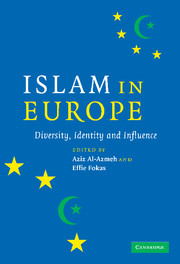Book contents
- Frontmatter
- Contents
- List of figures
- List of contributors
- List of abbreviations
- Preface
- 1 Introduction
- 2 Christians and Muslims: memory, amity and enmities
- 3 The question of Euro-Islam: restriction or opportunity?
- 4 Muslim identities in Europe: the snare of exceptionalism
- 5 From exile to diaspora: the development of transnational Islam in Europe
- 6 Bosnian Islam as ‘European Islam’: limits and shifts of a concept
- 7 Islam in the European Commission's system of regulation of religion
- 8 Development, discrimination and reverse discrimination: effects of EU integration and regional change on the Muslims of Southeast Europe
- 9 Breaching the infernal cycle? Turkey, the European Union and religion
- 10 Afterword
- Index
- References
7 - Islam in the European Commission's system of regulation of religion
Published online by Cambridge University Press: 05 June 2012
- Frontmatter
- Contents
- List of figures
- List of contributors
- List of abbreviations
- Preface
- 1 Introduction
- 2 Christians and Muslims: memory, amity and enmities
- 3 The question of Euro-Islam: restriction or opportunity?
- 4 Muslim identities in Europe: the snare of exceptionalism
- 5 From exile to diaspora: the development of transnational Islam in Europe
- 6 Bosnian Islam as ‘European Islam’: limits and shifts of a concept
- 7 Islam in the European Commission's system of regulation of religion
- 8 Development, discrimination and reverse discrimination: effects of EU integration and regional change on the Muslims of Southeast Europe
- 9 Breaching the infernal cycle? Turkey, the European Union and religion
- 10 Afterword
- Index
- References
Summary
Researchers have usually dealt with the Europeanisation of Islam at the grass-roots level (recomposition of religious beliefs, trends in interethnic and cross-border marriages, mixed couples, internet-based Muslim networks, large-scale European gatherings, and the role of religious leaders influential in Europe such as Tariq Ramadan). In this chapter, this process of Europeanisation will be considered at the institutional level with a focus on transnational Muslim organisations in relation to the European institutions. A twofold movement has taken place simultaneously. On the one hand, European Muslims have actively sought the opportunity to become actors in the European integration process. On the other hand, since the Delors presidency, the European Commission has developed tools in order to facilitate dialogue with religious and humanistic bodies through the Forward Studies Unit (FSU), a ‘think tank’ attached to the Presidency of the Commission, which was replaced in 2001 by the Group of Policy Advisers (GOPA). The following analysis will focus on this particular level of the European institutions, as it is both transversal and political. Very early the Commission wished to engage Muslims in this dialogue, but it faced difficulties finding representative interlocutors on a European level.
Following the signing of the Single European Act in 1986, and in the prospect of the European Single Market in 1992, a growing number of pressure groups opened liaison offices in Brussels. Religious organisations, mostly Christians, were part of this trend. At that time, both Catholics and Protestants increased their presence in Brussels through COMECE and EECCS respectively.
- Type
- Chapter
- Information
- Islam in EuropeDiversity, Identity and Influence, pp. 125 - 148Publisher: Cambridge University PressPrint publication year: 2007
References
- 7
- Cited by

